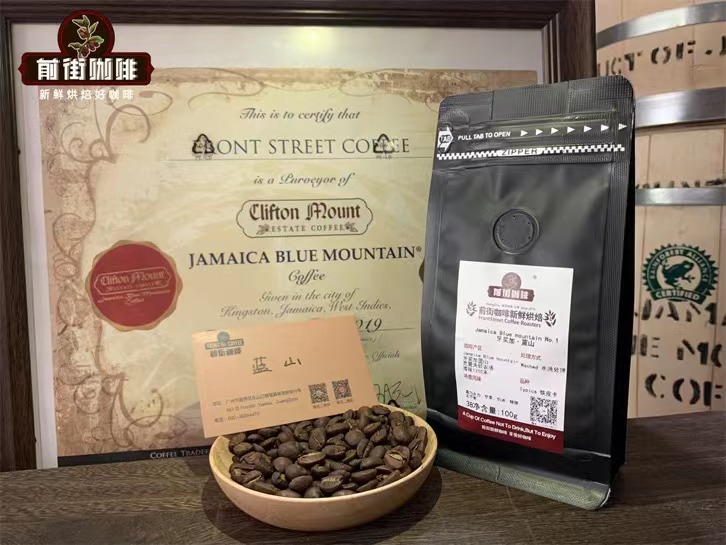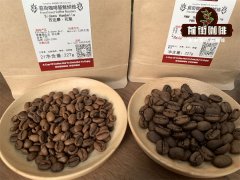How to choose coffee beans are all good? boutique coffee beans recommended
A delicious cup of coffee starts with fresh, perfectly roasted coffee beans. But where can you find the best beans and which countries of origin have the most interesting flavors? Qianjie Coffee introduces some coffee bean guides from all over the world, as well as the flavor of various types of coffee and so on!
In the front street coffee, there are many kinds of coffee in the bean list, which will dazzle you, and you don't know where to choose. It doesn't matter. Next, Qianjie will introduce you to several kinds of coffee that represent the characteristics of the producing area.
Jamaican Blue Mountain Coffee
Jamaica produces relatively little coffee each year, and not all of it comes from the Blue Mountains. But the coffee grown here grows at a very high altitude.
Its yield is extremely limited, with about 80% of its crops sold to Japan each year. In addition, these beans are so labor-intensive that they need to be picked by hand from the hillside. High elevations, cool temperatures and volcanic soil help lead to nearly 10 months of harvest, which is much longer than in other coffee-growing areas.
The resulting cup of coffee will be balanced with the whole body, medium acidity and mild sweetness. Some people say that Blue Mountain Coffee is the smoothest coffee they have ever had.

Kenyan coffee
Kenyan coffee beans are one of the best in the world. The efforts made by farmers to clean and process these beans are unparalleled.
Perhaps one of the biggest contributors to the quality of Kenyan coffee is that farmers are rewarded for better coffee. The government held an auction to auction all the coffee from Kenya. Higher-quality coffee costs more, giving farmers an incentive to improve their crops.
& # 39 is the largest bean, followed by & # 39; AB'. In Kenya, the bigger the better. Always look for "AA". These coffees are characterized by sweet fruity, wine acidity and syrup-like body. Because of the processing, these coffees are one of the cleanest in the world.
Indonesian Sumatra bean
The coffee is named after the Mandarin people who once grew coffee in northern Sumatra. The coffee from this region has low acidity and is sweet and smooth. Coffee has a variety of flavors, from cocoa and tobacco to soil and herbs. Many people choose dark roasted Sumatran coffee to enhance its sweetness and almost spicy taste.
Coffee throughout Sumatra is usually processed by a mixed method, similar to wet shelling. This method of processing may be the biggest factor affecting the result of coffee. These beans are perfect for mocha pots.
Sumatra mantrin beans are one of the biggest disputes in coffee. Coffee drinkers often like or hate it. What about you?
This is a hard-to-find coffee for several reasons. Few cafes serve it because it is a very expensive coffee and is best served as filtered coffee. Cafes mainly serve milk-based drinks, so it makes no sense for many people to offer black-only coffee. You've probably never had this kind of coffee before. It's really unique. If you like lighter, brighter coffee, you need to give it a try.
Central American geisha coffee beans
Geisha coffee beans are one of the most unique coffee beans in the world.
Although in theory they can grow anywhere, they enjoy a special reputation when they are grown in Panama and Costa Rica. The most famous farm is Hacienda La Esmeralda. Geisha beans were first found near the town of geisha in Ethiopia. It was not until the 1960s that this bean variety entered Panama.
What makes geisha beans unique? It has a natural tea-like body with lots of clear, bright, sparkling flavors such as citrus, mango, peach and jasmine. You can also smell some bergamot or vanilla.
Ethiopian Yega Sheffield beans
Yega Sheffield is regarded as a sacred relic in the global coffee industry.
Ethiopia itself is considered to be the birthplace of Yegashefi coffee and coffee beans, and is its pride and joy. Sidama is a region of Ethiopia that contains a miniature area of Yegashefi. However, there are smaller areas in Yega Chefen: Adado, Ariza, Cochele, Conga and so on.
Ethiopian coffee is usually wet-processed, and the coffee produced is light, almost tea-like, with complex fruit and floral aromas. Walk into any boutique coffee shop and you will probably find coffee from the area on the shelf. It is easy to understand why these coffees are called the door to quality coffee.
Acidity and bitterness
Coffee is naturally acidic, but that's not a bad thing. The acidity is good because it gives the coffee a natural flavor. But different beans have different degrees of acidity, and some people are very sensitive to these acids. The acidity in coffee has more to do with taste than pH value, although many people claim that acidity in coffee can cause digestive problems.
Coffee from Africa usually has a high acidity with a fruity or floral flavor.
Coffee from places such as Brazil or Sumatra is low in acidity with cocoa and nutty flavours.
Acidity is greatly affected by altitude. Coffee grown at lower elevations usually has lower acidity.
Bitterness is the result of brewing. The coffee that is too bitter IS is bad. If you extract too much from ground coffee, the result will be a rough, bitter aftertaste. This usually occurs when your grinding size is too fine or excessive brewing of grinding powder. The particles are smaller, so the water can come into contact with more coffee and eventually extract more coffee.
Bitterness is the result of brewing. The coffee that is too bitter IS is bad. If you extract too much from ground coffee, the result will be a rough, bitter aftertaste. This usually occurs when your grinding size is too fine or excessive brewing of grinding powder. The particles are smaller, so the water can come into contact with more coffee and eventually extract more coffee.
All in all: the bitterness in coffee can be avoided by brewing it correctly. The acidity in coffee is natural and unavoidable. But you can "mask" some acidity with deep-baked or low-sour beans.
Important Notice :
前街咖啡 FrontStreet Coffee has moved to new addredd:
FrontStreet Coffee Address: 315,Donghua East Road,GuangZhou
Tel:020 38364473
- Prev

How to use hand brewing coffee pot it is better to use high quality coffee beans or individual beans.
If you want to make your own simple and delicious coffee, then the price of hand-brewed coffee is first introduced in front of the street coffee, because the current boutique coffee is very popular with the majority of coffee people, and the special feature of boutique coffee is that its unique flavor is fascinating. It can best reflect the flavor of boutique coffee. Although hanging-ear coffee is also easy to operate, it is related to
- Next

The difference between coffee beans and coffee powder do coffee beans and coffee powder stay fresh for the same time?
No one can argue that fresh coffee is the best coffee. The fresher the beans, the more delicious the coffee will be. Do you know how to keep coffee fresh? At Qianjie Coffee, we will provide tips and tips for storing coffee from purchase to drinking. How to keep coffee intact and ground, how to store coffee beans in cans, how to keep brewed coffee fresh, and so on.
Related
- What brand of black coffee is the most authentic and delicious? what are the characteristics of the flavor of the authentic Rose Summer Black Coffee?
- Introduction to the principle and characteristics of the correct use of mocha pot A detailed course of mocha pot brewing coffee is described in five steps.
- Which is better, decaf or regular coffee? how is decaf made?
- How much is a bag of four cat coffee?
- How about four Cat Coffee or Nestle Coffee? why is it a cheap scam?
- Which is better, Yunnan four Cats Coffee or Nestle Coffee? How about cat coffee? is it a fake scam? why is it so cheap?
- How about Cat Coffee? what grade is a hoax? which instant coffee tastes better, four Cat Coffee, Nestle Coffee or G7 coffee?
- Process flow chart of coffee making-Starbucks coffee making process what coffee tastes good at Starbucks
- The top ten best coffee beans in the world Rose summer coffee or Tanzanian coffee tastes good
- Yunnan four cat coffee is good to drink?_four cat coffee is a big brand? four cat blue mountain coffee is fake?

